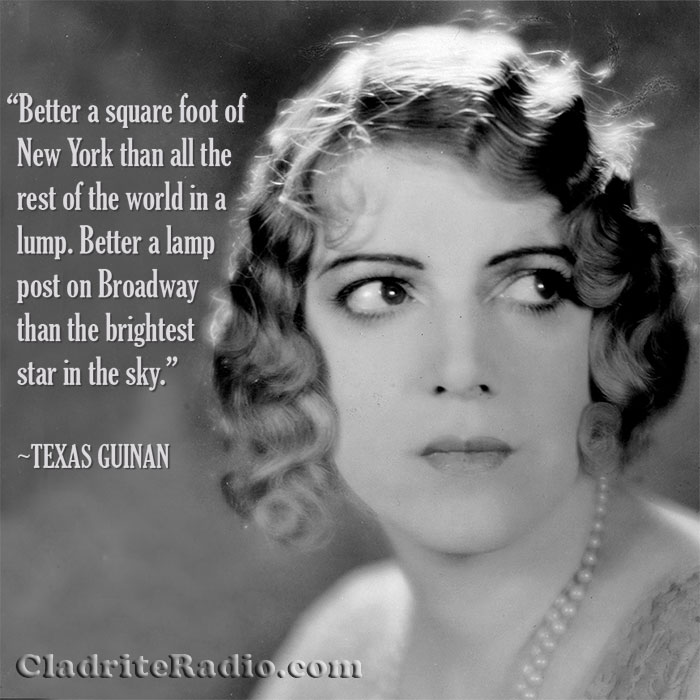Here are 10 things you should know about lyricist and librettist Dorothy Fields, born 116 years ago today. We’re featuring her songs all today on Cladrite Radio, so be sure to tune in!
Tag: Irving Berlin
10 Things You Should Know About Alice Faye
Here are 10 things you should know about Alice Faye, born 105 years ago today. She was a huge star who all but pulled the plug on her career before the age of 40.
Happy 129th Birthday, Irving Berlin!
The immortal Irving Berlin was born Israel Isidor Baline in Tolochin, Russian Empire, 129 years ago today. The great Jerome Kern once said of Berlin, “Irving Berlin has no place in American music—he is American music,” and we couldn’t agree more. Perhaps no songwriter’s works are heard more often on Cladrite Radio. Here are 10 IB Did-You-Knows:
- Berlin’s father, Moses, a cantor in a synagogue, moved his family to New York City when Irving was five to escape anti-Jewish pogroms. Berlin said his only memory of Russia was lying on a blanket by the road as a young child and watching the family home burn to the ground.
- Moses, unable to find work as a cantor, worked instead in a kosher meat market near the family’s home on the Lower East Side and gave Hebrew lessons on the side. He died when Berlin was just 13. Irving began working as a newsboy at age eight, hawking The New York Evening Journal, and his mother, Lena, worked as a midwife.
- While selling papers on the Bowery, Berlin was exposed to the popular music of the day pouring out of the neighborhood’s saloons and restaurants. He began to sing some of those songs as he sold papers, and picked up some spare change from appreciative customers in return.
- At 14, feeling he wasn’t contributing enough to the family’s welfare, he moved out, spending his nights in a series of lodging houses along and near the Bowery. He at first made his living stopping in saloons and singing songs for tips, but before long, he took a job singing at Tony Pastor’s Music Hall in Union Square and at 18, he got a job as a singing waiter at the Pelham Cafe in Chinatown. All the while, he was teaching himself to play piano during his off-hours.
- Berlin’s first hit, Alexander’s Ragtime Band, created a ragtime craze that reached even his native Russia.
- It’s estimated that Berlin, one of the few songwriters of his era who composed both lyrics and melody, wrote as many as 1,500 songs, including the scores for 19 Broadway shows and 18 Hollywood films. His songs received seven “Best Original Song” Academy Award nominations, with White Christmas, written for the 1942 picture Holiday Inn, earning Berlin an Oscar.
- Berlin was not a fan of Elvis Presley‘s recording of White Christmas, going so far as to send a letter to the nation’s top radio stations, requesting that they not play it over the air.
- All Berlin’s songs were written solely on the black keys of the piano, which is the key of F Sharp. His specially constructed piano had pedals that changed the key for Berlin.
- Berlin’s hit song Easter Parade was a reworking of one of his earlier songs, Smile and Show Your Dimple.
- Despite his association with the holiday, Christmas was a bittersweet day for Berlin, whose infant son, Irving Berlin, Jr., died on Christmas 1928 of typhoid fever.
Happy birthday, Irving Berlin, wherever you may be!

Happy 133rd Birthday, Texas Guinan!
Actress and Queen of the Nightclubs Texas Guinan was born Mary Louise Cecilia Guinan 133 years ago today in Waco, Texas. Here are 10 TG Did-You-Knows:
- Guinan was one of seven children. Her parents were Irish-Canadian immigrants. She attended parochial school at a Waco convent.
- When Guinan was 16, her parents moved the family to Denver, Colorado. There she began to appear in amateur stage productions before marrying newspaper cartoonist John Moynahan at age 20. The pair moved to Chicago, where she studied music. She eventually divorced Moynahan and began to perform in vaudeville as a singer.
- Guinan’s singing was reportedly no great shakes, but she had lots of pep and she soon found that she improved her prospects as a performer by regaling the audience with (perhaps exaggerated) tales of her “Old West” upbringing.
- In 1906, Guinan moved to New York City, where she worked as a chorus girl before finding additional work in vaudeville and on the New York stage.
- In 1917, Guinan made her movie debut and soon was a regular in western pictures. She is said to have been the first movie cowgirl (her nickname was The Queen of the West). Guinan would go on to appear in more than 50 features and shorts before she died in 1933.
- With the passage of the 18th Amendment, Guinan became active in the speakeasy industry, serving as hostess and emcee for a long string of illicit (but very popular) nightspots. Her outsized, sassy personality and her skill at evading justice, despite her many arrests for operating a speakeasy, made her a legendary figure in Prohibition-era NYC.
- Guinan’s speakeasies featured an abundance of scantily clad fan dancers and showgirls, but her penchant for pulling the legs of the rich and famous served her just as well. “Hello, suckers!” became her standard exclamation for greeting customers. Her well-to-do patrons she referred to as her “butter-and-egg men” and she coined the familiar phrase “Give the little ladies a big hand” while serving as emcee.
- Texas Guinan’s nightclubs were often backed by gangster Larry Fay and such legendary bad guys as Arnold Rothstein, Owney Madden and Dutch Schultz frequented her establishments—alongside relatively “good guys” such as George Gershwin, Walter Chrysler, Pola Negri, Mae West, Al Jolson, Gloria Swanson, John Gilbert, Clara Bow, Irving Berlin, John Barrymore and Rudolph Valentino.
- Ruby Keeler and George Raft both got their starts in show business as dancers as Guinan’s clubs, and Walter Winchell acknowledged that the inside access Guinan gave him to Broadway’s cornucopia of colorful characters helped launch his career as a gossip columnist.
- Guinan died of amoebic dysentery in 1933, one month before Prohibition was repealed. She was just 49. Bandleader Paul Whiteman and writer Heywood Broun were among her pallbearers.
Happy birthday, Texas Guinan, wherever you may be!

Happy 120th Birthday, Ethel Waters!
Singer and actress Ethel Waters was born in Chester, Pennsylvania, 120 years ago today. Here are 10 EW Did-You-Knows:
- Ethel’s mother was a teenage rape victim, and hers was a difficult childhood. She was raised in poverty and she never lived anywhere more than 15 months. “I never was a child,” she would say later. “I never was cuddled, or liked, or understood by my family.”
- Waters married at 13, but the man she married abused her and she left him to become a maid at a hotel in Philadelphia. When she was 17, she sang two songs at a costume party at a nightclub and was such a hit that she was offered work performing at the Lincoln Theatre in Baltimore.
- That engagement launched Waters’ career on the black vaudeville circuit. In Atlanta, she found herself working at the same club as blues legend Bessie Smith, who insisted that Waters not perform the same kind of music she was, so during their time on the same bill, Smith sang the blues and Waters stuck to popular songs.
- In 1919, Waters made her way to Harlem, debuting at a black club there called Edmond’s Cellar.
- In 1921, Waters became the fifth black woman to make a record on the small Cardinal label. Before long, she moved up to Black Swan Records, where she recorded with Fletcher Henderson. In 1925, she signed with Columbia records, for whom she recorded the hit song, Dinah (in 1998, that recording was given the Grammy Hall of Fame Award, one of three such awards Waters’ 1920s recordings received).
- As her star continued to rise, Waters began to play “white” vaudevile on the Keith Circuit, which paid more and increased her fame.
- In 1929, Waters introduced the Harry Akst song, Am I Blue? It was a huge hit for her and became her signature song.
- In the early 1930s, Waters starred at the Cotton Club and appeared in Irving Berlin’s hit musical revue As Thousands Cheer; she was the first black woman to appear in an otherwise all-white show.
- In 1933, Waters was, thanks to her continuing nightclub work, her stage success and her national radio program, the highest paid performer on Broadway.
- In the 1940s, Waters’ career was on the wane and she experienced legal and health problems. In 1951, she wrote her autobiography, His Eye Is on the Sparrow with Charles Samuels. A later memoir, To Me, It’s Wonderful, established her birth year as 1896; she’d been lying about her age for some time in order to get a group insurance policy.
- In her later years, Waters began to focus on gospel music and spirituals, often touring with evangelist Billy Graham. In 1983, she was posthumously inducted into the Gospel Music Hall of Fame.
Happy birthday, Ethel Waters, wherever you may be!

